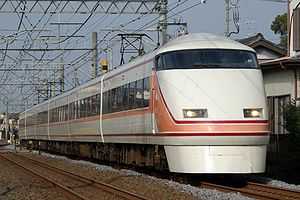Tobu 60000 series
| Tobu 60000 series | |
|---|---|
 Set 61601 on a test run on the Noda Line, May 2013 | |
| In service | 15 June 2013 |
| Manufacturer | Hitachi |
| Built at | Kudamatsu, Yamaguchi |
| Constructed | 2013– |
| Number under construction | 24 vehicles (4 sets) |
| Number built | 24 vehicles (4 sets) |
| Number in service | 24 vehicles (4 sets) |
| Formation | 6 cars per trainset |
| Fleet numbers | 61601–61602 |
| Capacity | 850 per set |
| Operator | Tobu Railway |
| Depot(s) | Nanakodai |
| Line(s) served | Tobu Noda Line |
| Specifications | |
| Car body construction | Aluminium alloy |
| Car length |
20,130 mm (66 ft 1 in) (end cars) 20,000 mm (65 ft 7 in) |
| Width | 2,800 mm (9 ft 2 in) |
| Height | 4,050 mm (13 ft 3 in) |
| Floor height | 1,125 mm (3 ft 8.3 in) |
| Doors | 4 pairs per side |
| Maximum speed | 120 km/h (75 mph) |
| Traction system | VVVF |
| Acceleration | 2.23 km/h/s |
| Deceleration |
3.5 km/h/s (service) 4.5 km/h/s (emergency) |
| Electric system(s) | 1,500 V DC overhead line |
| Current collection method | PT7112-B single-arm pantograph |
| Bogies |
TRS-12M (motored) TRS-12T (trailer) |
| Braking system(s) | Electronically controlled pneumatic brakes |
| Safety system(s) | Tobu ATS |
| Track gauge | 1,067 mm (3 ft 6 in) |
The Tobu 60000 series (東武60000系 Tōbu 60000-kei) is a Japanese DC commuter electric multiple unit (EMU) train type operated by the private railway operator Tobu Railway on Tobu Noda Line services since June 2013.[1][2]
Overview
The first two six-car sets were introduced on the 62.7 km Tobu Noda Line from 15 June 2013, replacing older 8000 series sets.[2][3] A further six sets (36 vehicles) are scheduled to be introduced during fiscal 2013.[2]
Based on the 50000 series EMUs first introduced in 2004, the 60000 series have aluminium alloy bodies with a double-skin construction manufactured using friction stir welding (FSW).[4] The trains feature VVVF control, and use fully enclosed motors reducing environmental noise.[4]
Externally, the front ends and upper bodysides are finished in "future blue", the colour used for the Tobu corporate logo, and "bright green" highlights are used on either side of the doors.[1]
Formation
As of 1 April 2013, the fleet consists of two six-car sets based at Nanakodai Depot.[3] The set consist of three motored (M) cars and three unpowered trailer (T) cars, and are formed as shown below with the Tc1 cars at the Kashiwa end.[1]
| Designation | Tc1 | M1 | M2 | T1 | M3 | Tc2 |
|---|---|---|---|---|---|---|
| Numbering | 61600 | 62600 | 63600 | 64600 | 65600 | 66600 |
| Capacity (total/seated) | 133/48 | 146/51 | 146/51 | 146/51 | 146/51 | 133/48 |
| Weight (t) | 27.7 | 33.1 | 33.1 | 28.1 | 31.9 | 27.8 |
The M1 and M3 cars each have one PT7112-B single-arm pantograph.[1]
Interior
Internally, the trains use LED lighting throughout, with the illumination level capable of being adjusted to 100%, 50%, or 25% brightness.[1] LCD passenger information displays are provided above the doors, and a Wi-Fi service is provided - for the first time on Tobu Railway trains.[1]
Seating consists of longitudinal bench seats throughout, with a seat width of 460 mm (18 in) per person.[1] Wheelchair spaces are provided at one end of each of the four intermediate cars.[1]
The glass panels on the doors separating each car are decorated with designs depicting the five different "city flowers" of the eight cities served by the Noda Line: cherry blossom (Saitama), wysteria (Kasukabe), sunflower (Kashiwa and Funabashi), rhododendron (Noda, Nagareyama, Matsudo), and Japanese bellflower (Kamagaya).[1]
-

7-person bench seating
-

Priority seating
-

Wheelchair space in car 62601
-

Passenger information screen
History
The first two sets, 61601 and 61602, were delivered from the Hitachi factory in Kudamatsu, Yamaguchi in March 2013.[5] Set 61601 entered revenue service on 15 June 2013, with 61602 entering service on 21 June 2013.[6] Sets 61603 and 61604 were delivered together from Hitachi in January 2014,[7] both entering revenue service from 27 January 2014.[8]
-

Set 61601 undergoing test running on the Tobu Nikko Line, April 2013
-

Set 61601 on the first day of revenue operations, June 2013
References
- ↑ 1.0 1.1 1.2 1.3 1.4 1.5 1.6 1.7 1.8 Takagi, Makoto (August 2013). "東武鉄道60000系" [Tobu 60000 series]. Japan Railfan Magazine (in Japanese) (Japan: Koyusha Co., Ltd.) 53 (628): p.60-66.
- ↑ 2.0 2.1 2.2 "2013年度の鉄道事業設備投資計画" [Fiscal 2013 railway business investment plan] (PDF). Tobu News release (in Japanese). Japan: Tobu Railway. 25 April 2013. Retrieved 26 April 2013.
- ↑ 3.0 3.1 私鉄車両編成表 2013 [Private Railway Rolling Stock Formations - 2013]. Japan: JRR. 30 July 2013. p. 52. ISBN 978-4-330-39313-1.
- ↑ 4.0 4.1 "野田線(大宮~船橋間)に新型車両「60000系」を導入します!" [New 60000 series trains to be introduced on Noda Line] (PDF). Tobu News release (in Japanese). Japan: Tobu Railway. 6 November 2012. Retrieved 6 November 2012.
- ↑ "東武鉄道60000系が甲種輸送される" [Tobu 60000 series delivered]. Japan Railfan Magazine Online (in Japanese). Japan: Koyusha Co., Ltd. 21 March 2013. Retrieved 21 March 2013.
- ↑ "東武鉄道 野田線用新型車両60000系デビュー" [Debut of new Tobu Noda Line 60000 series trains]. Tetsudō Daiya Jōhō Magazine (in Japanese) (Japan: Kōtsū Shimbun) 42 (351): p.70-71. July 2013.
- ↑ "60000系12輌が甲種輸送される" [12 60000 series cars delivered]. RM News (in Japanese). Japan: Neko Publishing Ltd. 15 January 2014. Retrieved 15 January 2014.
- ↑ "【東武】61603F・61604F営業運転開始" [Tobu sets 61603 and 61604 enter revenue service]. RM News (in Japanese). Japan: Neko Publishing Ltd. 28 January 2014. Retrieved 28 January 2014.
External links
| Wikimedia Commons has media related to Tobu 60000 series. |
- Tobu 60000 series information (Japanese)
| |||||||||||||
